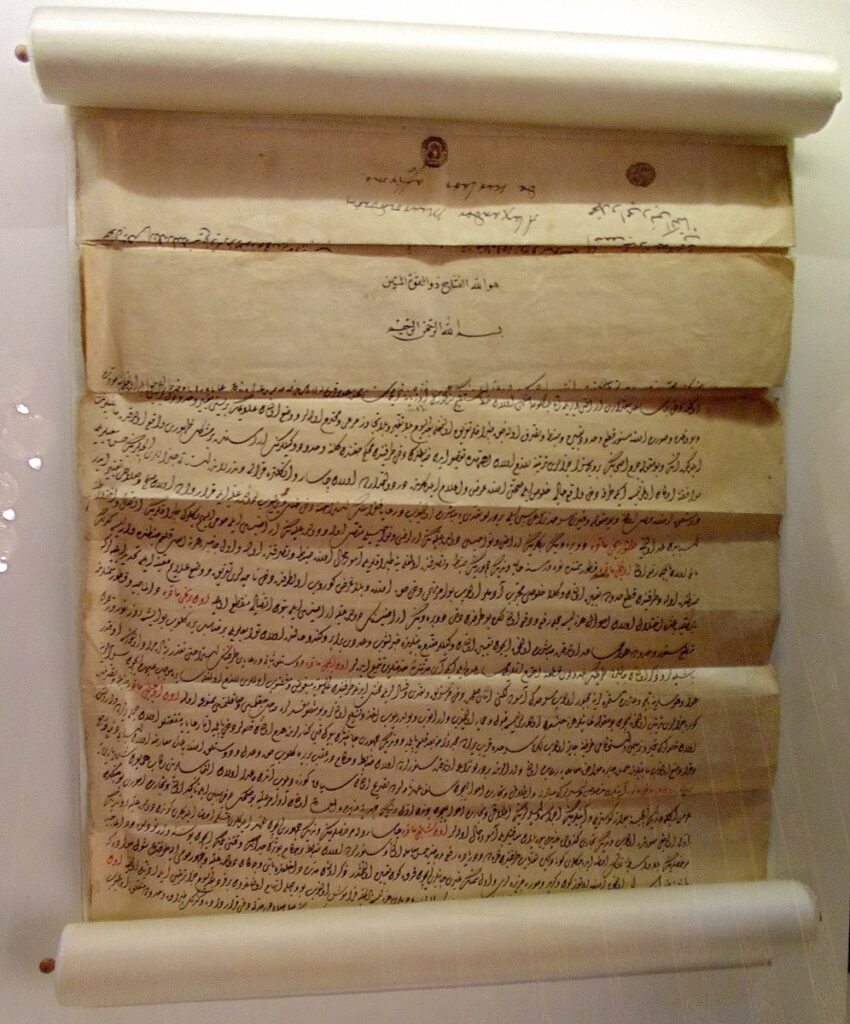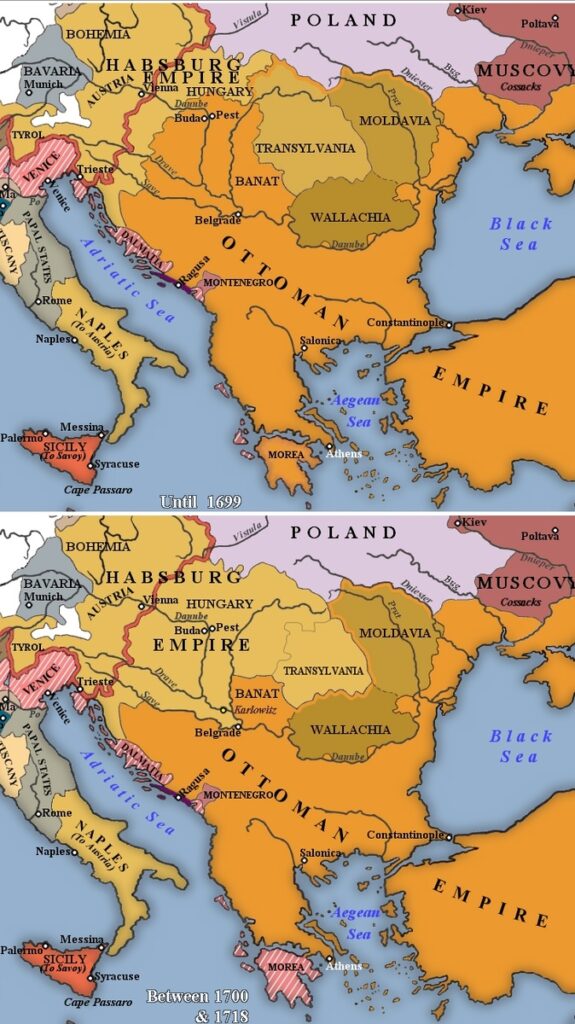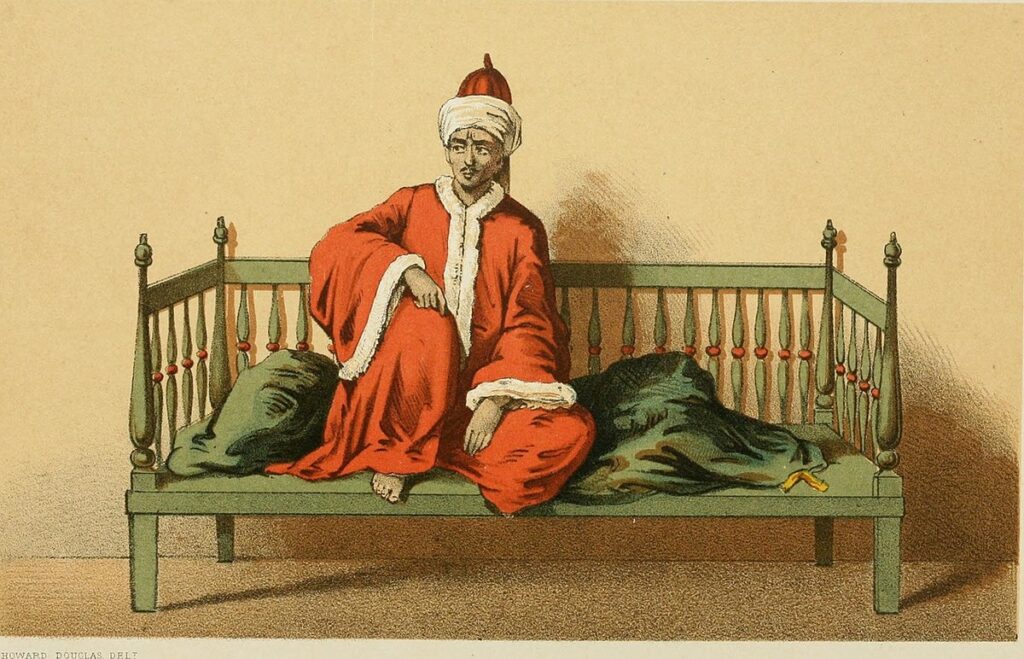At the turn of the XVII-XVIII centuries, the Ottoman Empire, formerly an inviolable stronghold, whose name frightened both peasant and queen, which was the eternal headache of many European and Asian countries, for the first time gave a crack. The 16-year war between the Ottomans and the Christian coalition consisting of the Polish-Lithuanian Commonwealth, the Russian Empire, Austria and motley Italian states exhausted the Sublime Porte and led it to the humiliating Peace of Karlowitz in 1699, which actually became the starting point in the subsequent centuries-long division of Turkish possessions between European countries.

A wave of Polish «winged cavalry» is bearing down on the Janissaries, 1683
Huge «buffer» provinces and strategically important islands and outposts fell away from the Empire. Transylvania, Parrcium, Hungary and Transcarpathia went to the Habsburg Crown, the Peloponnesian Peninsula and the Ionian Islands were given to Venice, Podolia returned after thirty years of the Turkish yoke to the native harbor of the Polish-Lithuanian Commonwealth, and the port of Azov, taken from the Turks by the young Tsar Peter Alekseevich, went to Russia.

The original of the Karlowitz Peace Treaty, written in Arabic for the Ottoman delegates.

Two maps showing the territory of the Ottoman Empire before and after the Peace of Karlovitz, concluded in 1699. Only Podolia, which was returned to Warsaw, is omitted.
The Ottoman Empire for a whole century was steadily sliding towards a general crisis.
Ayans who had gained strength — leaders of large craft guilds, heads of Janissary garrisons, judges (kadi), respected in the Muslim community — since 1695 received from the Sultan the opportunity not only to buy the post of tax collectors in the provinces (pashaliks), but also to «stake» this rank for life. Meanwhile, corruption, which had a fantastic scope and covered from the Porte by everyone — from ayans and governors of provinces — pashalik-pasha — to simple justices of the peace and peasant headmen — paralyzed the empire. The word «bakhshish», i.e. bribe or bribe, from a purely legal criminal concept entered and firmly established in the everyday life of all Ottoman estates. The civil bureaucratic apparatus, in itself cumbersome and even more chaotic than the ancient Roman one, neighbored the Islamic legal system based on Sharia law, the boundaries of which were very blurred. Industry and major commerce were in decline, as were the army and navy, which lost over 202,000 men killed and wounded during the Great Turkish War. Since the army still devoured up to half of the empire’s finances and did not bring it a dime, and the military elites ruling in the pashaliks often did not know how to conduct business and paid nothing to the Porte, cash receipts from the regions to the state budget for the second half of the XVII century fell from 360 to 288 million acce (small silver coin), which forced the government to start selling off state lands and transferring ports, manufactures, mines, roads and lands into the hands of large oligarchs and Muslim authorities. It came to auctions: who would offer more for a particular town or mine.

Ottoman Akçe
The empire was turning from a predator into a victim. Foreign merchants — guests now adored by the Sultan’s court — took key positions in the Porte’s trade with the outside world, preventing Turkish negociants from entering the world market and oppressing domestic Ottoman industry with a simultaneous flood of consumer goods, supplies of luxury goods and a wave of quality goods.
Previously, the authority of the Sultan was unquestionable, he himself embodied the power in the empire, always remained a person inviolable and sacred, like the sheriff of Mecca and Sheikh-ul-Islam — the man in charge of all religious affairs in the Ottoman Empire. Now the Janissary corps, which had slipped out of the iron gauntlet (the Janissaries were often merchants and governors themselves), arbitrarily decided which of the sultan’s initiatives would be developed and which would go under the table. Provinces-pashaliks, of which there were 19, sometimes broke away from the imperial monolith and returned back only after bloody campaigns of the Sultan’s troops. The empire was shaken by epidemics of plague and smallpox, spontaneous peasant revolts, armed rebellions of the Dervishes and Roshanites, bandit violence, raids by Nubian and Highland tribes, price hikes and brutal religious persecution.

Sheikh-ul-Islam
In general, the promising Ottoman economy and the highly rational administrative system that had been in place under Suleiman the Magnificent had seriously deteriorated by the end of the seventeenth century and lay, perhaps not in ruins, but certainly in serious decline. Turkey, due to a number of important reasons, did not manage to rebuild itself from a purely feudal state into a semi-capitalist one, as the European powers, China or the Great Moguls had done.
Much earlier than the described events, on December 30, 1673, in the town of Dobricha, Silistrian Sadzhak (county), now located in Bulgaria, in the family of the then Sultan Mehmed Hunter, was born the future ruler of the Ottoman Empire — Ahmed III.

Ottoman Empire in 1699
Ahmed’s father was an extremely strong, healthy and cheerful man, who loved hunting, colorful performances and religious disputes, in which he displayed an incredible knowledge of the Shari’ah law. He was seldom lazy and never drunk, but he had no outstanding ability in government, finance, poetry, or warfare, and therefore often relied on his gifted dignitaries. His entire role was (as he saw it) to maintain order in religious affairs in the empire and to coordinate the actions of viziers, ayans and pashas, preventing them from tearing the empire to pieces. Sultan left after himself only sons 20, and already daughters few people and counted.
But the mother of Ahmed III, Emetullah Rabia Gulniyush Sultan, was an outstanding woman. She was born in Venice, so she was originally called Lucrezia Alcino. She entered the harem, one might say, by pure chance, but soon pushed aside all her rivals, overshadowing them with her beauty and intelligence. In addition to the fact that Rabia could sing beautifully, compose verses and play virtuoso on ancient Arabic instruments, she also managed to conduct diplomatic affairs, keeping in tension the country from where she herself was born — the Venetian Republic, to engage in economics, to study Latin and Arabic, to solve agrarian issues in a number of pashaliks and even to command troops. Emetullah enjoyed unquestionable authority in the Ottoman society, meeting her herself promised a person good luck in life. She actively participated in the government during the short reign of her eldest son Mustafa, who was overthrown in 1703. But she did it extremely discreetly, through her people around the sultan (she died in 1715 at the age of 73). So no one could throw accusations at her that she had usurped power.

Emetullah Rabia Gulnüş Sultan, portrait by an unknown artist of the 17th century

The young heir to the Turkish throne, Ahmed Osman.
So, Ahmed. He was Mustafa’s younger brother, but, contrary to the traditions of the Ottoman court, was on excellent terms with him. Being under the influence of his mother, Ahmed grew up a spoiled child with great ambitions and European thinking, while he was extremely well-read and from an early age knew what a real court life.
Sultan Mustafa, who came to power in 1695, failed to complete the war with the Christian coalition in favor of Turkey. After the humiliating peace treaty, the «ministerial hustle» began: the empire changed four Grand Viziers and more than 70 major officials and dignitaries, but not one of them could not solve the economic problems of the country and bring to mind the reforms that began at the end of the reign of Mehmed the Hunter. The sultan spent his time in debauchery and gluttony and did not even visit the capital, taking refuge with armed guards in the city of Edirne. In August 1703, unable to withstand the brazen purchase of posts, tax oppression, inadequate actions of Sultan Mustafa and corruption of the government of his Grand Vizier — Rama Mehmed Pasha, the common people, supported (and partly armed) by the Janissary Corps and most of the capital’s merchant and craft elite, raised a large-scale revolt against Mustafa and expelled his officials from Constantinople. In just three days the city was completely occupied by the rebels. Under pressure from his entourage, Mustafa decided to give up the throne in favor of his younger brother Ahmed, called the Third, whose candidacy suited all the warring parties at once.
